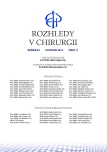-
Články
- Vzdělávání
- Časopisy
Top články
Nové číslo
- Témata
- Kongresy
- Videa
- Podcasty
Nové podcasty
Reklama- Kariéra
Doporučené pozice
Reklama- Praxe
Cerebral salt wasting syndrome (CSWS) – rare case from a surgical department
Authors: D. Šmíd 1; P. Novák 1; J. Fichtl 1; V. Opatrný 1; D. Bludovský 2
Authors place of work: Chirurgická klinika FN a LF UK v Plzni, přednosta: prof. MUDr. V. Třeška, DrSc. 1; Neurochirurgické oddělení FN a LF UK v Plzni, primář: MUDr. V. Přibáň, Ph. D. 2
Published in the journal: Rozhl. Chir., 2014, roč. 93, č. 11, s. 549-553.
Category: Kazuistika
Tato práce byla podpořena grantem MZ IGA NT14227.
Summary
Introduction:
Cerebral salt wasting syndrome (CSWS) is one of several possible causes of the development of hyponatraemia in patients with severe cranial trauma associated with intracranial bleeding and brain oedema. Other possible causes of post-traumatic hyponatraemia include the syndrome of inappropriate antidiuretic hormone secretion (SIADH).Case history:
The authors present the case of a twenty-five-year-old polytraumatized female patient who was treated in our department and who was diagnosed with cerebral salt wasting syndrome.Conclusion:
In patients with severe cranial trauma and subsequent hyponatraemia, CSWS should be considered. It is crucial to distinguish between CSWS and SIADH as wrongly selected treatment can have serious or even fatal impacts for a gravely injured patient.Key words:
CSWS – SIADH – cranial trauma − hyponatraemia
Zdroje
1. Peters JP, Welt LG, Sims EA, Orloff J, Needham J. A salt – wasting syndrome associated with cerebral disease. Trans. Assoc Am Physicians 1950;63 : 57−64.
2. Cort JH. Cerebral salt wasting. Lancet 1954;266 : 752−4.
3. Momi J, Tang CM, Abcar AC, Kujubu DA, Sim JJ. Hyponatremia – what is cerebral salt wasting? Perm jurnal 2010;14 : 62−5.
4. Sterns RH, Silver MS. Cerebral salt wasting versus SIADH: What difference? Jour Am Soc Nephrol 2008;19 : 194−196.
5. Audibert G, Steinmann G, Talance GS, Laurens MH, Dao P, el al. Endocrine response after severe subarachnoid hemorrhage related to sodium and blood volume regulation. Neurosurgical anesthesiology and neuroscience 2009;108 : 1922−1918.
6. Ascar A, Tarif N. Cerebral salt wasting in a patient with head trauma: Management with saline hydration and fludrocortisone. Saudi J kidney dis. and transplant 2007;18 : 95−99.
7. Costa KN, Nakamura HM, Cruz LR, de Miranda LSVF, Santos Neto RC, et al. Hyponatremia and brain injury. Absence of alterations of serum brain natriuretic peptide and vasopressin. Arq Neuropsiquiatr 2009;67 : 1037−1044.
8. Albanese A, Hindmarsh P, Stanhope R. Management of hyponatremia in patients with acute cerebral insult. Arch Dis Child 2001;85 : 246−251.
9. Vylam P, Šutak V, Winkler M. Posttraumatický syndrom cerebrálně podmíněné ztráty vody a iontů (CSWS) – kazuistika. Rozhl Chir 2006;85 : 269−272.
10. Jabor A, et al. Vnitřní prostředí. Praha, Grada Publishing 2008.
11. Lohani S, Devkota UP. Hyponatremia in patients with traumatic brain injury: Etiology, Incidence and severiry correlation. World neurosurgery 2011;76 : 355−360.
12. Schwartz WB, Benett W, Curelop S, Bartter FC. A syndrome of renal sodium loss and hyponatremia probably resulting from inappropriate secretion of antidiuretic hormone. Am J Med 1957;23 : 529−542.
13. Greenberg A, Verbalis JG. Vasopresin receptor antagonist. Kidney International 2006;69 : 2124−2130.
14. Spasovski G, et al. Clinical practise quideline on diagnosis and treatment of hyponatremia. Nefrol Dial Transplant 2014;29(2):i1−i39.
Štítky
Chirurgie všeobecná Ortopedie Urgentní medicína
Článek Komplikace v chirurgii
Článek vyšel v časopiseRozhledy v chirurgii
Nejčtenější tento týden
2014 Číslo 11- Metamizol jako analgetikum první volby: kdy, pro koho, jak a proč?
- Nejlepší kůže je zdravá kůže: 3 úrovně ochrany v moderní péči o stomii
- Stillova choroba: vzácné a závažné systémové onemocnění
- Metamizol v léčbě různých bolestivých stavů – kazuistiky
-
Všechny články tohoto čísla
- Komplikace v chirurgii
- 3D High Resolution anorektální manometrie ve funkčním hodnocení anorekta
- Efekt dekomprese krční míchy při spondylogenní myelopatii na korové funkce mozku
- Vztah antikoagulační a antigregační terapie u nemocných s chronickým subdurálním hematomem k závažnosti předoperačního stavu a výsledku chirurgické léčby
- Pilonidální sinus – diagnóza na pomezí všeobecné a plastické chirurgie
- Cerebral salt wasting syndrom (CSWS) – nezvyklá kazuistika z chirurgického pracoviště
- Karcinóm sigmy v inkarcerovanej slabinovej prietrži
- Audit českých chirurgických pracovišť
- Nový atlas varixov dolných končatín
- Rozhledy v chirurgii
- Archiv čísel
- Aktuální číslo
- Informace o časopisu
Nejčtenější v tomto čísle- Cerebral salt wasting syndrom (CSWS) – nezvyklá kazuistika z chirurgického pracoviště
- Pilonidální sinus – diagnóza na pomezí všeobecné a plastické chirurgie
- Karcinóm sigmy v inkarcerovanej slabinovej prietrži
- Komplikace v chirurgii
Kurzy
Zvyšte si kvalifikaci online z pohodlí domova
Autoři: prof. MUDr. Vladimír Palička, CSc., Dr.h.c., doc. MUDr. Václav Vyskočil, Ph.D., MUDr. Petr Kasalický, CSc., MUDr. Jan Rosa, Ing. Pavel Havlík, Ing. Jan Adam, Hana Hejnová, DiS., Jana Křenková
Autoři: MUDr. Irena Krčmová, CSc.
Autoři: MDDr. Eleonóra Ivančová, PhD., MHA
Autoři: prof. MUDr. Eva Kubala Havrdová, DrSc.
Všechny kurzyPřihlášení#ADS_BOTTOM_SCRIPTS#Zapomenuté hesloZadejte e-mailovou adresu, se kterou jste vytvářel(a) účet, budou Vám na ni zaslány informace k nastavení nového hesla.
- Vzdělávání



